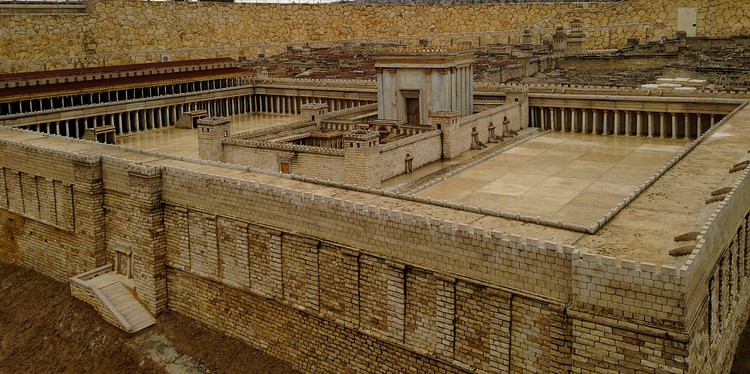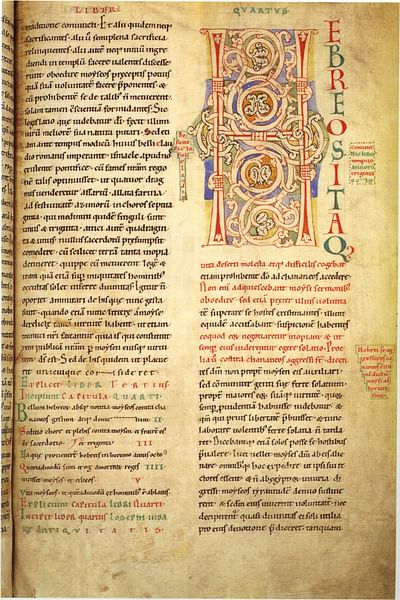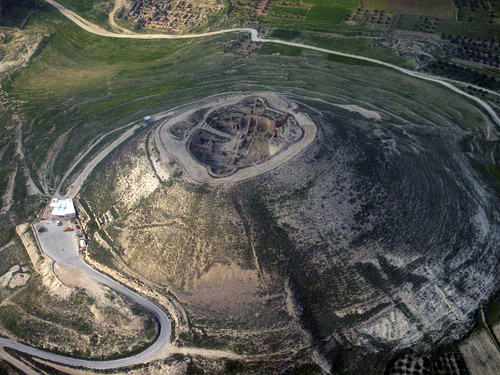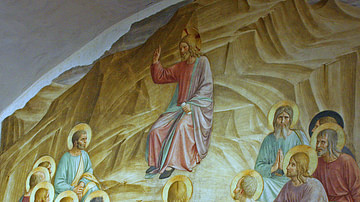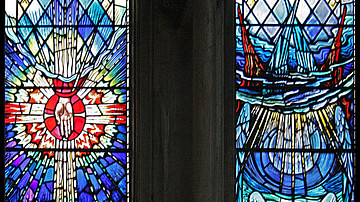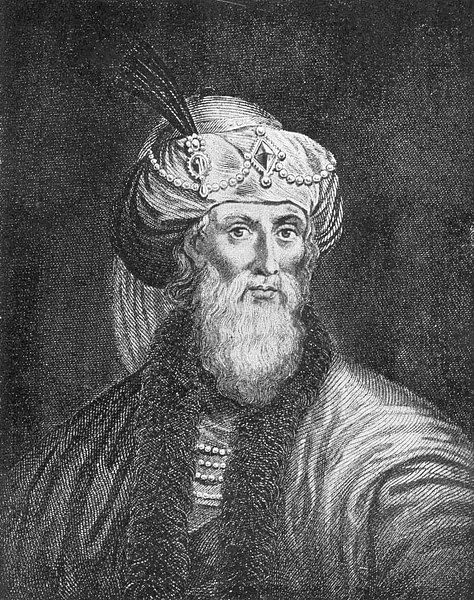
Titus Flavius Josephus (36-100 CE), was born Yosef ben Matityahu and became a 1st-century CE Jewish historian. He was a member of a priestly household in Jerusalem through his father’s side (the house and order of Jehoiarib), and his mother was of royal descent (Hasmonean). He was educated in Jerusalem and most likely shared ideology and sympathy with the party of the Pharisees.
The writings of Josephus are crucially important for several disciplines: Second Temple Judaism in the 1st century CE, background sources for the early history of Christianity, historical details of the client kings of the Roman Empire in the East, and the line of the Julio-Claudian emperors in Rome. In the last decades of the 1st century CE, he wrote The Jewish War (c. 75 CE), Antiquities of the Jews (c. 95 CE), Against Apion (c. 97 CE), and The Life of Flavius Josephus (c. 99 CE).
Josephus & the Great Jewish Revolt of 66 CE
As a member of the Jerusalem aristocracy, in 64 CE, Josephus traveled to Rome to negotiate with Roman emperor Nero (r. 54-68 CE) for the release of some Jewish priests who were being held hostage for various reasons. When he returned to Jerusalem, the party of the Zealots had convinced the majority of the Jews to revolt against Rome. Josephus was appointed the military governor of Galilee. In relation to the revolt, the cities of Galilee were divided, some adhering to the authority of the Roman government while others had joined the forces of the rebel John of Gischala.
With some success in organizing the Galilee, all victories were lost when Nero appointed the general Vespasian (r. 69-79 CE) to invade the region. Josephus was under siege in the hill town of Jotapata (Yodfat). He and 40 others were trapped in a cave. According to his version of the story, he suggested that they commit collective suicide, rather than be slaves of Rome. They drew lots to help kill each other. Josephus and one other man were left. This is when Josephus changed his mind and surrendered. While awaiting execution, he reminded Vespasian that all Jews had the gift of prophecy and predicted that Vespasian would become the next emperor of Rome.
Josephus claimed that he had a vision that explained the tide of the war: God (as in the past in the conquests of the Jews by the Assyrians and Babylonians) used the Romans to punish Israel for its sins. Fortune (fate) was now on the side of the Romans with God’s help, and Josephus’ role was to announce what had happened to the rebelling Jews.
From this point on, Josephus served as a consultant to the Roman forces. When Vespasian left to successfully challenge other contenders after the death of Nero, his son Titus (r. 79-81 CE) took over the siege of Jerusalem. Josephus and Titus developed a close relationship. During the siege, Josephus pleaded with the Zealots who had taken over the Temple complex and the city to surrender. In 70 CE, the Roman army broke through, and the Temple complex was destroyed as well as the main parts of the city. Josephus claimed that Titus never intended to destroy the Temple, but that it was the result of a fire started by accident by one of the soldiers.
After the war, he was rewarded for his service by moving to a former house of Vespasian (Titus Flavius Vespasianus) in Rome and adopted his name along with his patronage. While in Rome, he had access to Roman records and archives from which to gather his sources for his histories.
The Jewish War (Bellum Judaicum)
Opening with a brief history of events from the middle of the 2nd century BCE to the revolt, this book remains the only contemporary, eyewitness account of the revolt. He described the horrific siege conditions and the suffering of the Jerusalemites through starvation. The work is also noteworthy for our only detailed description of the setting up of a Roman legionary camp (Book III). Similar to modern histories, he catalogued the reasons that led to the war. These included both details of corrupt Roman governors during the 50s and the 60s CE, as well as the fanatical views of the Zealot party. In Josephus’ view, the Zealots carried most of the blame for the disaster.
The book served two purposes:
- It detailed the invincibility of the might of Rome, perhaps to discourage other Jewish communities in the Empire from rebellion.
- It provided an apologia (an explanation) to a Roman audience that despite the fanatical Zealots, most Jews were loyal subjects of Rome.
The last chapter of the book detailed the siege of Masada, an ancient fortress on the shores of the Dead Sea. After the destruction of Jerusalem, the Zealots who escaped garnered the remainder of the rebels in a last hold-out against Rome. After three years of Roman siege warfare, the attackers finally broke through, only to find that the occupants had committed mass suicide. In this chapter, the leader of the group, Eleazar, provided a long speech on why death is better than slavery to Rome. It included issues that Josephus had described in another earlier siege site in Galilee, Gamla, which resulted in suicide.
The story of Masada remains controversial among scholars because in this case, Josephus was not an eyewitness. The rhetoric of the speeches reflects Greco-Roman concepts of noble death and may have been idealized by Josephus. The site of Masada continues to be excavated by archaeologists with the goal of verifying his story (or not).
The Antiquities of the Jews
Perhaps his greatest work in 20 volumes, Josephus provided a history of Jews and Judaism from creation to the outbreak of the war. The source for the earlier years was taken from the Jewish Scriptures, but he also repeated the problems of Roman rule as it led to the revolt. It is noteworthy for the absence of details on most of the Prophets of Israel. The Prophets predicted a future kingdom of God, which would destroy the current overlords. This would have been a politically incorrect issue to emphasize to a Roman audience. Instead, Josephus highlighted the culture and civilized rationality of the Law of Moses, presenting Judaism in its best light.
The work is invaluable for the section that describes various sects of Jews in the 1st century CE: Pharisees, Sadducees, Essenes, and those who eventually became the Zealots. During the centuries leading to the revolt, he described several messianic contenders and their efforts to stir up the people at the festivals at the Temple to motivate God to usher in the kingdom. This provides important historical context for ideas that were in the air during the ministry of Jesus of Nazareth.
The Antiquities is also important for the details of the client kingdoms of the Roman Empire, particularly that of Herod the Great (c. 75-4 BCE) and the Herodian Dynasty. Herod the Great had a court scribe, Nicholas of Damascus, who kept the details of his reign. The work is no longer extant but survived in Josephus’ utilizing it for many of the details. As such, we know more about Herod the Great than any other ancient person, including Julius Caesar (100-44 BCE). Because Josephus was living in Rome, we also gain details about the Julio-Claudian Dynasty of the first Roman emperors. Josephus was not averse to reporting gossip and scandal.
For scholars of early Christianity, Josephus looms large in his descriptions of the death of John the Baptist (d. c. 30 CE) by Herod Agrippa and his details concerning the governorship of Pontius Pilate (26-36 CE). His litany of Pilates’ abuses of Roman law and order in the province belies the description of a sympathetic Pilate at the trial and crucifixion of Jesus of Nazareth in the gospels.
One of the most controversial passages occurs in Book 18 and is presented as a digression in his description of Pontius Pilate:
About this time there lived Jesus, a wise man, if indeed one ought to call him a man. For he was one who performed surprising deeds and was a teacher of such people as accept the truth gladly. He won over many Jews and many of the Greeks. He was the Christ. And when, upon the accusation of the principal men among us, Pilate had condemned him to a cross, those who had first come to love him did not cease. He appeared to them spending a third day restored to life, for the prophets of God had foretold these things and a thousand other marvels about him. And the tribe of the Christians, so called after him, has still to this day not disappeared. (18.3., transl. by Louis H. Feldman)
Scholars debate if this passage was originally written by Josephus or added by a later Christian to validate Christian beliefs. It became more famous in the Middle Ages as proof of the story of Jesus, as it demonstrated an objective, outsider’s point of view. The passage is problematic because this is the only reference to Jesus or the Jesus movement in Josephus’ writings. What is odd, is the fact that if Josephus believed that Jesus was the Christ (the messiah of Scripture), there should have been more details and references to the missions of the apostles throughout the empire. But after this passage, he went on to describe more abuses and conflicts under Roman rule. Some modern scholars attempt to recover the original by eliminating the Christological references, turning it into just one more report of a messianic contender.
In describing the rule of the procurator Albinus (62 CE), Josephus included the story of the stoning of James, the brother of Jesus:
And now Caesar, upon hearing the death of Festus, sent Albinus into Judea, as procurator. But the king deprived Joseph of the high priesthood and bestowed the succession to that dignity on the son of Ananus, who was also himself called Ananus ... But this younger Ananus was a bold man in his temper, and very insolent; he was also of the sect of the Sadducees, who are very rigid in judging offenders, above all the rest of the Jews ... Ananus was of this thought he had now a proper opportunity (to exercise his authority). Festus was now dead, and Albinus was but upon the road; so he assembled the Sanhedrin of judges, and brought before them the brother of Jesus, who was called Christ, whose name was James, and some others, and when he had formed an accusation against them as breakers of the law, he delivered them to be stoned. (Antiquities, 20.9)
Ananus was dismissed as high priest for acting on his own before the next Roman magistrate had arrived. Josephus did not clarify the details of the accusation as "breakers of the law." However, by the 2nd century CE, the story of James was expanded to include details of his piety so that he was then known as James the Just. According to this version, he was thrown down from the pinnacle of the Temple and considered one of the first Christian martyrs.
Vita (Life)
Added to the end of Antiquities was Josephus’s biography. This was not a true autobiography, but an explanation for why he took the side of Rome during the revolt. It was most likely written as a response to a polemical tract against Josephus by another Jewish writer, Justus of Tiberias. Justus had written his own history of the war in Galilee and blamed its loss on Josephus. Josephus described Justus as a devote Zealot, and thus a traitor to Rome. He accused Justus of attacking the mixed cities of the Decapolis (across the Jordan) and instigating further rebellion. In this version of the events in the Galilee, Josephus claimed that he was against the revolt from the very beginning.
Against Apion (Contra Apionem)
An earlier title of this work was Concerning the Antiquity of the Jews Against the Greeks, written as a response to criticism leveled against the Jews. Beginning with the Greek conquests under Alexander the Great in 330 BCE, we have evidence of both Jewish and Greek literature that critiqued each other’s culture and practices. Apion (30 BCE - 48 CE) was a Hellenized Egyptian grammarian who wrote commentaries on Homer, and he was just one of the latest to critique Judaism. Non-Jews (Gentiles) respected Jews for their antiquity but considered them to be eccentric and antisocial as they did not join in the many religious festivals of the Empire.
Not only did Josephus defend Judaism for its antiquity but also pointed to a consistent tradition that was the polar opposite of the Greeks' with their many contradictory myths and the bad behavior of the gods in Greek mythology. He utilized the teachings and precepts of philosophy to claim that Judaism provided the most rational way of life. Josephus emphasized the ethics and morals of Judaism against (typical) Jewish charges of immorality among non-Jews.
The Legacy of Josephus
Beginning in the 19th century and beyond, Josephus became central to the movement that became known as the quest for the historical Jesus. As the main source for the history and culture of Judaism in the 1st century CE, archaeologists reference the information in Josephus in their reconstructions of towns and villages in the region. In 2013, the Israeli archaeologist Ehud Netzer claimed to have discovered the tomb of Herod the Great at Herodium through a careful reading of Josephus’ description of the surrounding territory.
For scholars of both ancient Judaism and the New Testament, Josephus is often problematic. Each passage has to be analyzed in light of his literary use of polemic, as well as Josephus’ tendency for self-promotion and apology in the events he described. Josephus is often analyzed by comparison with the writings and methods of contemporary historians. In the preface to Antiquities, he stressed historical accuracy: "I shall accurately describe what is contained in our records, in the order of time that belongs to them ... without adding anything to what is therein contained or taking away anything therefrom" (Antiquities, Preface 3)
But like all ancient historians, he did not strictly stick to the facts but included morality and psychology behind the actors and actions. In this sense, he is similar to the 1st-century BCE historian Dionysius of Halicarnassus who utilized a similar pattern. In his description of Rome, Dionysius praised their piety and the role of divine providence in their success. Josephus did the same for the Jews. Despite the analytical problems and debates, without the writings of Josephus, we would have very little access to the people and events of his time.
